
The Freddie Mercury Tribute Concert for AIDS Awareness was a benefit concert held on Easter Monday, 20 April 1992, at Wembley Stadium in London, England, for an audience of 72,000. The concert was produced for television by Ray Burdis, directed by David Mallet and broadcast live on television and radio to 76 countries around the world, with an audience of up to one billion. The concert was a tribute to Queen's lead vocalist, Freddie Mercury, who died of an AIDS-related illness on 24 November 1991.

Sheer Heart Attack is the third studio album by the British rock band Queen, released on 8 November 1974 by EMI Records in the United Kingdom and by Elektra Records in the United States. Digressing from the progressive themes featured on their first two albums, the album featured more pop-centric and conventional rock tracks and marked a step towards the "classic" Queen sound. It was produced by the band and Roy Thomas Baker, and launched Queen to mainstream popularity in the UK and throughout the world.

Innuendo is the fourteenth studio album by the British rock band Queen, released on 4 February 1991 by Parlophone in the United Kingdom and was the band's first studio album to be released by Hollywood Records in the United States. Produced by David Richards and the band, it was the band's last album to be released in lead singer Freddie Mercury's lifetime, and their most recent one to be composed of entirely new material, save for The Cosmos Rocks by the Queen + Paul Rodgers collaboration. The album reached the No. 1 spot on the UK album charts for two weeks, and also peaked at No. 1 in Italy, the Netherlands, Germany, and Switzerland, staying at No. 1 for three weeks, four weeks, six weeks, and eight weeks, respectively. It was the first Queen album to go Gold in the US upon its release since The Works in 1984.
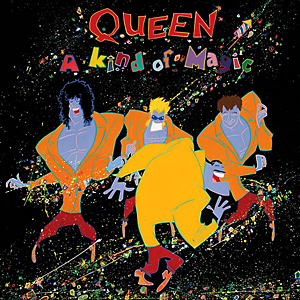
A Kind of Magic is the twelfth studio album by the British rock band Queen, released on 2 June 1986 by EMI Records in the UK and by Capitol Records in the US. It is based on the soundtrack to the film Highlander, directed by Russell Mulcahy.

Barcelona is a collaborative studio album recorded by Freddie Mercury, lead singer of popular British rock band Queen, and operatic Soprano Montserrat Caballé. It was released in 1988 and serves as the second and final album by Mercury to be recorded outside of Queen.

"I Was Born to Love You" is a 1985 song by Freddie Mercury that was released as a single from his first solo album, Mr. Bad Guy. After Mercury's death, Queen re-worked this song for their album Made in Heaven in 1995, by having the other members play their instrumental parts over the original track, transforming the song from disco to rock. The Queen version from the Made in Heaven album also includes snippets of Mercury's ad-lib vocals taken from "A Kind of Magic" and from "Living on My Own".

"Don't Stop Me Now" is a song by the British rock band Queen, featured on their 1978 album Jazz and released as a single on 26 January 1979. Written by lead singer Freddie Mercury, it was recorded in August 1978 at Super Bear Studios in Berre-les-Alpes (Alpes-Maritimes), France, and is the twelfth track on the album.

"No-One But You " is the final single recorded by the British rock band Queen. Recorded and released in 1997, six years after the death of lead singer Freddie Mercury, it is the only Queen recording to feature a three-piece lineup: guitarist Brian May, drummer Roger Taylor, and bassist John Deacon. May and Taylor share lead vocals. The song was released on the album Queen Rocks and it was also released as a double a-side single with "Tie Your Mother Down". It was later included on the compilation album Greatest Hits III.

"Who Wants to Live Forever" is a song by the British rock band Queen. A power ballad, it is the sixth track on the album A Kind of Magic, which was released in June 1986, and was written by lead guitarist Brian May for the soundtrack to the film Highlander. Queen was backed up by an orchestra, with orchestrations by film score composer Michael Kamen. The song peaked at No. 24 in the UK charts. In 1991, it was included in the band's second compilation album, Greatest Hits II.

"Now I'm Here" is a song by English rock band Queen, released on their third studio album, Sheer Heart Attack (1974). Written by guitarist Brian May, the song is noted for its gritty guitar riffs and vocal harmonies. In the UK, the song reached #11 on the charts when released as a single in 1975. The song was a live favourite, performed at virtually every concert from late 1974 to 1986.

"Las Palabras de Amor (The Words of Love)" is a rock ballad by the British rock band Queen. It was released as the third single from their 1982 album Hot Space. It is sung mostly in English, but with several Spanish phrases. Written by guitarist Brian May, the song proved more popular in the United Kingdom than their previous single ("Body Language"), reaching No. 17 in the UK Singles Chart.

"Friends Will Be Friends" is a song performed by Queen, written by Freddie Mercury and John Deacon, released on 9 June 1986 as a single for the album A Kind of Magic. It was the band's 30th single in the UK upon its release, reaching number 14 in the UK.
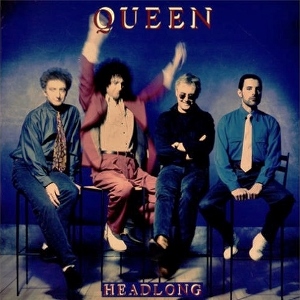
"Headlong" is a song by British rock band Queen, released as the third single from their fourteenth studio album, Innuendo in May 1991. The song was written by Queen guitarist Brian May, who intended to record it for his then-upcoming solo album Back to the Light (1992), but when he heard Queen lead singer Freddie Mercury sing the track, he allowed it to become a Queen song. As with all the songs on Innuendo, the track was promptly credited to the entire band.

The Works is the eleventh studio album by the British rock band Queen. It was released on 27 February 1984 by EMI Records just shortly after recording for the album had been completed in the United Kingdom and it is the band's first studio album to be released by Capitol Records in the United States. After the synth-heavy Hot Space (1982), the album saw the re-emergence of Brian May and Roger Taylor's rock sound, while still incorporating the early 80s retro futuristic electronic music and New York funk scenes. Recorded at the Record Plant Studios in Los Angeles, California, and Musicland Studios in Munich, Germany, from August 1983 to January 1984, the album's title comes from a comment Taylor made as recording began – "Let's give them the works!".

The Solo Collection is a compilation box set detailing the solo career of Freddie Mercury; it includes the material Mercury recorded before joining up with Queen, up through the 1993 No More Brothers remixes. Mercury's two studio albums are included, along with various single edits and non-album singles, B-sides, remixes, instrumentals, collaborations, a large number of demo recordings and a set of interviews conducted by David Wigg. Also included are two DVDs: a collection of Mercury's promotional music videos, and a documentary covering his life.
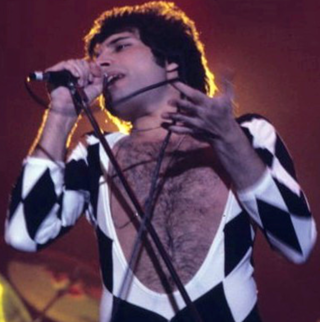
As well as his work with Queen, Freddie Mercury released one solo album, one collaborative album, and several singles. Although his solo work was not as commercially successful as most Queen albums, the two off-Queen albums and several of the singles debuted in the top 10 of the UK Music Charts. Following Mercury's death in 1991, several posthumous box sets and compilation albums have been released.
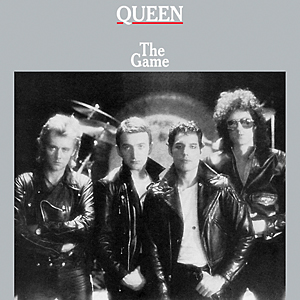
The Game is the eighth studio album by the British rock band Queen. It was released on 30 June 1980 by EMI Records in the UK and by Elektra Records in the US. The Game features a different sound from its predecessor, Jazz (1978). The Game was the first Queen album to use a synthesizer.

"In My Defence" is a song performed by Queen lead vocalist Freddie Mercury. It was from the 1986 musical Time by Dave Clark and featured on the Time concept album. The song was not a hit during Mercury's lifetime but was released posthumously in November 1992, reaching number eight on the UK Singles Chart.

"Love Kills" is a song by Freddie Mercury, and his first song released as a solo artist, though the other members of Queen appeared on the song - initially uncredited.
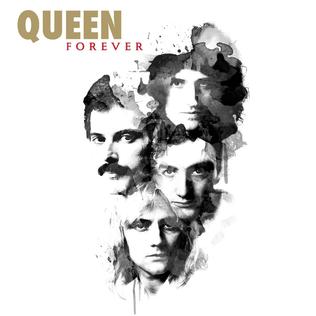
Queen Forever is a compilation album by the British rock band Queen. Released on 10 November 2014, it features tracks the band had "forgotten about" with vocals from original lead singer Freddie Mercury. Queen's bassist John Deacon is also on the tracks.




















